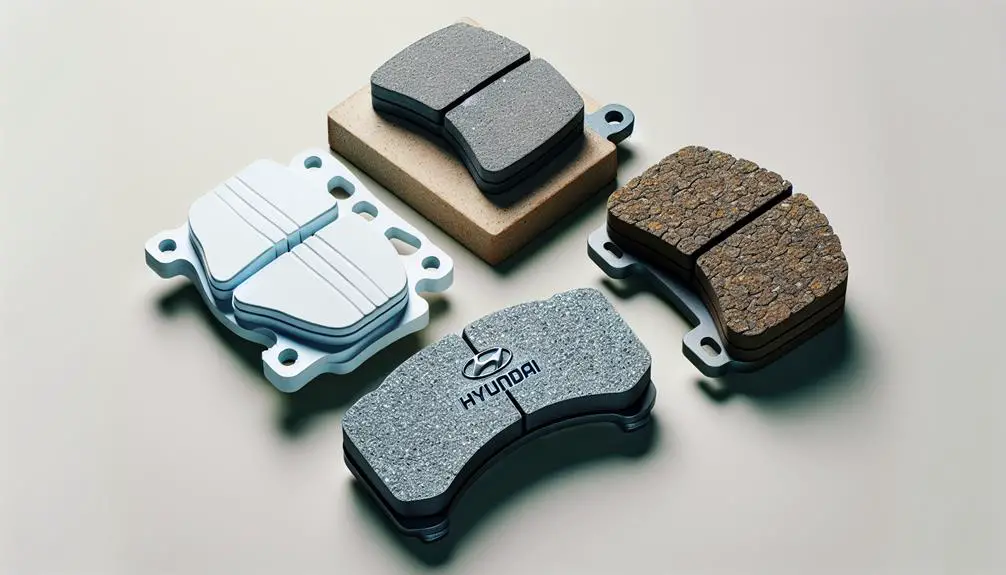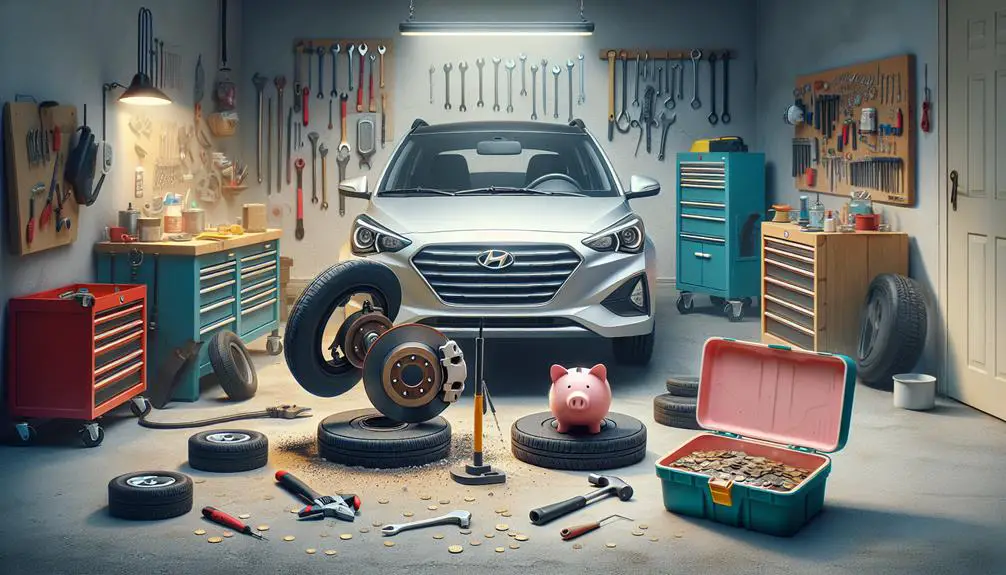The cost of Hyundai brake pads varies widely depending on the model, material, and quality.
While the safety of your Hyundai hinges on reliable brake pads, the cost can swing as widely as your driving habits and the roads you frequent.
You're facing a market where prices vary not just by model but by the material and quality of the pads themselves.
If you're contemplating whether to go for a professional replacement or to tackle it as a DIY project, the costs involved can be quite different.
This discussion aims to navigate the labyrinth of options available to you, guiding you towards making an informed decision that balances both safety and budget.
Let's examine what factors to explore before making your next purchase.
Understanding Brake Pad Pricing

When looking at the price of Hyundai brake pads, it's important to understand that different factors can greatly influence their cost. You've got to take into account the type of brake pads you're opting for, the brand, and where you're purchasing them from. Each of these elements plays a significant role in the final price you'll pay.
To start off, there's the matter of the type of brake pads. You've got options like ceramic, semi-metallic, and organic. Ceramic pads usually run at a higher price point because of their longevity and quieter operation. Semi-metallic pads, while more affordable, mightn't last as long but offer better performance for aggressive driving. Organic pads are the softest and cheapest, but they wear out faster and aren't as effective in harsh driving conditions.
Then there's the brand to think about. Premium brands often charge more, claiming superior materials and technology that extend the life of the brake pads and, by extension, your vehicle's braking system. However, don't discount aftermarket brands that might offer comparable quality at a lower price.
Where you're buying these brake pads also matters. Local auto parts stores might charge a premium because of convenience and immediate availability. On the other hand, online retailers could offer the same products at a reduced cost since they've lower overhead expenses. However, watch out for shipping costs that can add up and potentially negate any savings.
Hyundai Model Variations
Diving into Hyundai's lineup, you'll notice that brake pad costs can vary substantially across different models and years. This variation often reflects the diversity in Hyundai's range, from compact cars to SUVs, each designed to suit different driving needs and preferences. Comprehending these variations can help you anticipate the cost of maintenance for your specific Hyundai model.
Here's a quick rundown of factors that affect brake pad costs across Hyundai models:
- Model Type: Generally, larger vehicles like the Santa Fe or Palisade may have higher brake pad costs than smaller models such as the Accent or Elantra. This is due to larger vehicles requiring more durable braking systems to handle their increased weight and size.
- Year of Manufacture: Newer models often incorporate advanced technology in their braking systems, which can lead to higher costs for parts like brake pads. Conversely, older models might've more affordable options available due to the wider availability of aftermarket parts.
- Performance Models: Hyundai's performance-oriented models, like those under the N line (e.g., Veloster N), typically require specialized brake pads to handle higher speeds and more aggressive driving conditions. These specialized pads can be pricier than those for standard models.
- Hybrid and Electric Variants: Models such as the Ioniq or Sonata Hybrid might use different braking systems that recuperate energy. The unique nature of these systems can affect the type and cost of brake pads they require.
Types of Brake Pads

Understanding the different types of brake pads available is essential as you navigate maintenance for your Hyundai. There are primarily four types of brake pads: ceramic, semi-metallic, organic, and low-metallic NAO. Each has its advantages and specific uses, depending on your driving habits and preferences.
Ceramic brake pads are known for their quiet operation and long-lasting wear. They produce less dust than other types and are ideal if you prioritize a clean look for your wheels and a silent ride. However, they're usually the most expensive option but offer excellent performance for everyday driving and moderate speeds.
Semi-metallic brake pads, containing about 30-65% metal, provide excellent heat dissipation and are more durable under heavy use, such as in high-performance or heavy vehicles. They're a bit noisier and create more brake dust, but their superior stopping power makes them a favorite among drivers who value performance.
Organic brake pads, made from a mixture of fibers and materials like glass, rubber, and carbon, offer quiet operation and are softer on your car's brake discs. They tend to wear out faster than other types, making them less suitable for extreme conditions but perfect for light use and city driving.
Low-metallic NAO pads have a small amount of metal added to improve heat dissipation while retaining the benefits of organic pads. They can be slightly noisier but offer a good balance between performance and wear.
Choosing the right brake pad type for your Hyundai depends on your driving style, performance needs, and budget. Each type offers a unique set of benefits, so consider what matters most to you before making a decision.
Professional Replacement Costs
Understanding the cost of professional replacement for your Hyundai's brake pads is important in budgeting for maintenance. When you're not keen on diving into the world of DIY, professional replacement offers a hassle-free solution. However, the convenience comes with its price tag, which varies based on several factors.
Here's a breakdown to help you gauge the potential costs:
- Labor Costs: Typically, labor charges range from $50 to $150 per axle. This depends on your location and the service provider.
- Brake Pad Cost: For Hyundai models, brake pads can cost anywhere between $50 and $120 per set. The price varies depending on the quality and type of brake pads you choose.
- Shop Supplies and Miscellaneous Fees: Don't forget to account for the small extras. Shops often charge for shop supplies, disposal fees, and possibly a small markup. This can add an additional $20 to $30 to your bill.
- Total Cost Estimate: Combining labor, parts, and miscellaneous fees, the total cost for professional brake pad replacement on a Hyundai can range from $120 to $300 per axle.
It's important to remember that these figures are estimates. The actual cost can vary based on your specific Hyundai model, the repair shop's rates, and the type of brake pads you opt for. Always ask for a detailed quote before proceeding with any service to avoid surprises. Additionally, consulting with a trusted mechanic can ensure that you're getting the right service for your car's needs.
DIY Replacement Savings

While opting for professional help guarantees quality, tackling brake pad replacement yourself can greatly reduce costs. When you choose the DIY route, you're primarily saving on labor charges which can be quite hefty. This isn't to say the task doesn't demand time and effort, but if you're mechanically inclined, the savings can be worth it.
Let's break down what you can expect to save by handling the replacement yourself compared to professional service. Remember, the exact numbers can vary based on your location and the model of your Hyundai.
| Expense | Professional Service | DIY |
|---|---|---|
| Parts | $$$ | $$ |
| Labor | $$$ | $ (Your Time) |
| Additional Services | $$ | Optional |
By choosing to replace your Hyundai's brake pads on your own, you're eliminating the labor cost, which is a significant portion of the bill when you go to a mechanic or dealership. Additionally, you have the freedom to shop around for the best prices on parts without being tied to what the service provider offers. This doesn't just result in direct savings but also allows you to better understand your vehicle's needs and maintenance requirements.
Taking on such tasks builds your confidence in DIY car maintenance, potentially leading to more savings down the road as you take on more complex tasks. However, it's important to weigh the value of your time and the importance of quality work, especially regarding brake systems.
Shopping for Brake Pads
When you're ready to purchase brake pads for your Hyundai, comparing prices and quality across different retailers is important to find the best deal. You'll want to make sure you're not only getting a good price but also high-quality brake pads that will last and perform well. Here's how you can make an informed decision:
- Research Online: Start by checking online automotive parts retailers. They often have detailed descriptions and reviews, which can help you understand the pros and cons of different brands and types of brake pads. Plus, online shops frequently offer competitive prices and discounts you mightn't find in physical stores.
- Visit Local Auto Parts Stores: Sometimes, speaking to a knowledgeable salesperson can make a big difference. They can offer recommendations based on your specific Hyundai model and driving habits. Moreover, you can avoid shipping costs and delays by purchasing in person.
- Check for Compatibility: Make sure the brake pads you're considering are compatible with your Hyundai model and year. Incorrectly sized brake pads can cause serious safety issues and may damage your vehicle's braking system.
- Look for Deals and Promotions: Both online and physical stores regularly run promotions or offer discounts. Sign up for newsletters or follow your favorite retailers on social media to stay informed about upcoming sales and exclusive offers.
Conclusion
So, you've navigated through the maze of Hyundai brake pad pricing, understanding the impact of model variations and types of pads on cost. Whether you're leaning towards professional replacement or diving into a DIY project, you're now equipped to shop smart.
Remember, investing in the right brake pads ensures your safety and your car's longevity. So, weigh your options, consider your budget, and make the choice that best suits your needs.
Happy shopping!